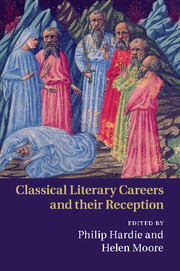Book contents
- Frontmatter
- Contents
- List of contributors
- Preface
- Note on the text
- Introduction: Literary careers – Classical models and their receptions
- 1 Some Virgilian unities
- 2 There and back again: Horace's poetic career
- 3 The Ovidian career model: Ovid, Gallus, Apuleius, Boccaccio
- 4 An elegist's career: from Cynthia to Cornelia
- 5 Persona and satiric career in Juvenal
- 6 The indistinct literary careers of Cicero and Pliny the Younger
- 7 Re-inventing Virgil's Wheel: the poet and his work from Dante to Petrarch
- 8 Did Shakespeare have a literary career?
- 9 New spins on old rotas: Virgil, Ovid, Milton
- 10 Bookburning and the poetic deathbed: the legacy of Virgil
- 11 Literary afterlives: metempsychosis from Ennius to Jorge Luis Borges
- 12 ‘Mirrored doubles’: Andrew Marvell, the remaking of poetry and the poet's career
- 13 Dryden and the complete career
- 14 Goethe's elegiac sabbatical
- 15 Wordsworth's career prospects: ‘peculiar language’ and public epigraphs
- Epilogue: Inventing a life – a personal view of literary careers
- List of works cited
- Index
12 - ‘Mirrored doubles’: Andrew Marvell, the remaking of poetry and the poet's career
Published online by Cambridge University Press: 10 November 2010
- Frontmatter
- Contents
- List of contributors
- Preface
- Note on the text
- Introduction: Literary careers – Classical models and their receptions
- 1 Some Virgilian unities
- 2 There and back again: Horace's poetic career
- 3 The Ovidian career model: Ovid, Gallus, Apuleius, Boccaccio
- 4 An elegist's career: from Cynthia to Cornelia
- 5 Persona and satiric career in Juvenal
- 6 The indistinct literary careers of Cicero and Pliny the Younger
- 7 Re-inventing Virgil's Wheel: the poet and his work from Dante to Petrarch
- 8 Did Shakespeare have a literary career?
- 9 New spins on old rotas: Virgil, Ovid, Milton
- 10 Bookburning and the poetic deathbed: the legacy of Virgil
- 11 Literary afterlives: metempsychosis from Ennius to Jorge Luis Borges
- 12 ‘Mirrored doubles’: Andrew Marvell, the remaking of poetry and the poet's career
- 13 Dryden and the complete career
- 14 Goethe's elegiac sabbatical
- 15 Wordsworth's career prospects: ‘peculiar language’ and public epigraphs
- Epilogue: Inventing a life – a personal view of literary careers
- List of works cited
- Index
Summary
For someone whose reputation as a major poet depends almost entirely on retrospective construction in the nineteenth and early twentieth century, Andrew Marvell has a surprising amount to say about his own literary career. For someone who was consciously aware of the way in which others around him and just before him had sounded their own trumpets, proclaiming themselves latter-day Virgils, Ovids or Lucans, Marvell is remarkable for the degree to which he is able in his verse and his prose to speculate on his own career as a poet even while refusing the terms of aggrandizement claimed by his contemporaries. Jonson, Milton, Herrick, Cowley, Davenant and Katherine Philips all took pains to make their voices major, distinctive and above or beyond the tradition that had formed them. Marvell is a poet who denied this sense of poetic egotism by a form of studied imitation (echoing all of the people named above and many more) but who nonetheless made a virtue and indeed a highly creative resource of being other men's (and women's) mirrors.
I once said, and was pilloried for it, that Marvell was a ‘weak poet’ in this sense and of course it was meant in a Bloomian sense. He did not murder his father poets in order to find his own voice so much as echo them within his own voice, never letting the discerning reader forget about their distinctive identity.
- Type
- Chapter
- Information
- Classical Literary Careers and their Reception , pp. 226 - 240Publisher: Cambridge University PressPrint publication year: 2010
- 1
- Cited by

